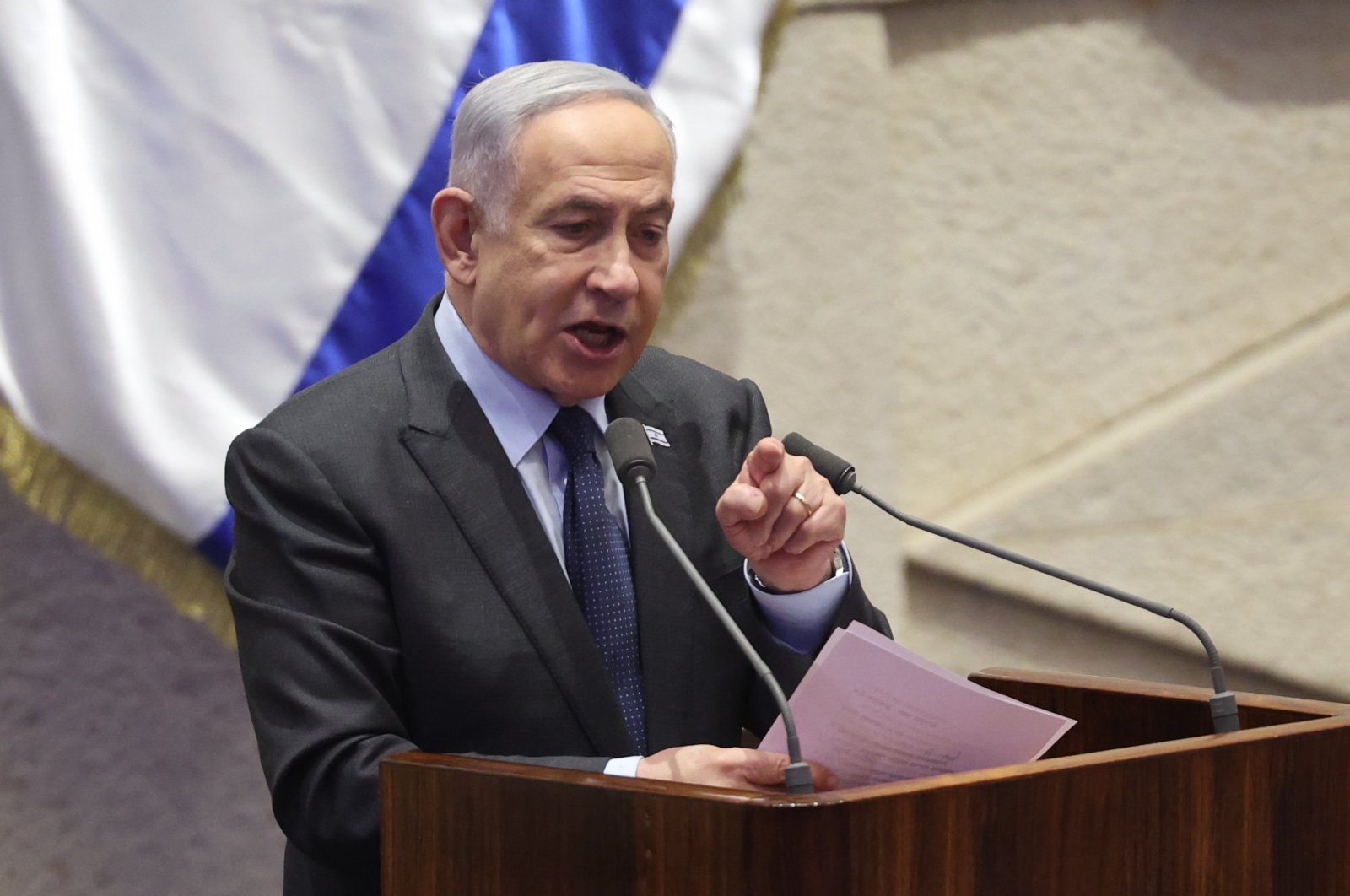Israel's Prime Minist" />
- Merkel set for fourth term as chancellor as CDU leads parliamentary vote, exit polls say
- Turkey says it will send back ISIS prisoners even if citizenships revoked
- General Marchenko: ‘Mykolaiv was to be next city to fall, but Russia terribly failed’
- Ukrainian Armed Forces repel enemy attacks in four regions
- Somalia president hails lifting of arms embargo as government vows to wipe out al-Shabab militants
- Captured Somali pirates arrive in India to face trial over ship hijacking
- Stay Connected
Israeli PM Netanyahu OKs new Gaza cease-fire talks amid pressure
Israel’s Prime Minister Benjamin Netanyahu approved new discussions on a cease-fire in Gaza, as his country continues to violate the recent U.N. Security Council resolution urging an immediate cease-fire and the World Court ordered it prevent enforced starvation of Palestinians and to ensure vital humanitarian aid reached the blockaded enclave.
 Israeli Prime Minister Benjamin Netanyahu speaks during the voting session for the impeachment of Hadash-Ta party MP Ofer Cassif in Jerusalem, Feb. 19, 2024. (EPA File Pho
Israeli Prime Minister Benjamin Netanyahu speaks during the voting session for the impeachment of Hadash-Ta party MP Ofer Cassif in Jerusalem, Feb. 19, 2024. (EPA File Pho
All News
-
Blinken tells GCC foreign ministers Israel must do more to boost Gaza aid
-
EXPLOSION KILLS SIX HORMUUD TELECOM WORKERS IN MOGADISHU ATTACK
-
US Gaza war protesters dig in despite university, police actions
-
Ukraine’s HUR Claims It Destroyed Ka-32 Helicopter at Moscow Airfield
-
Hamas says it received Israel’s response to its ceasefire proposal
-
UN calls to preserve forensic evidence of Gaza mass graves
-
Türkiye to provide Iraq technical help to bolster border security
-
Rep. Omar joins pro-Palestinian protest at University of Minnesota
-
Israel intensifies strikes across Gaza, orders new evacuations in north
-
Ukraine, Israel aid package heads to Biden as Congress caps months-long struggle
- Home
- Merkel set for fourth term as chancellor as CDU leads parliamentary vote, exit polls say
- Turkey says it will send back ISIS prisoners even if citizenships revoked
- General Marchenko: ‘Mykolaiv was to be next city to fall, but Russia terribly failed’
- Ukrainian Armed Forces repel enemy attacks in four regions
- Somalia president hails lifting of arms embargo as government vows to wipe out al-Shabab militants
- Captured Somali pirates arrive in India to face trial over ship hijacking
- RSS
Contact@kasmaal.com
- Merkel set for fourth term as chancellor as CDU leads parliamentary vote, exit polls say
- Turkey says it will send back ISIS prisoners even if citizenships revoked
- General Marchenko: ‘Mykolaiv was to be next city to fall, but Russia terribly failed’
- Ukrainian Armed Forces repel enemy attacks in four regions
- Somalia president hails lifting of arms embargo as government vows to wipe out al-Shabab militants
- Captured Somali pirates arrive in India to face trial over ship hijacking
- Stay Connected
Israeli PM Netanyahu OKs new Gaza cease-fire talks amid pressure
Israel’s Prime Minister Benjamin Netanyahu approved new discussions on a cease-fire in Gaza, as his country continues to violate the recent U.N. Security Council resolution urging an immediate cease-fire and the World Court ordered it prevent enforced starvation of Palestinians and to ensure vital humanitarian aid reached the blockaded enclave.

Israeli Prime Minister Benjamin Netanyahu speaks during the voting session for the impeachment of Hadash-Ta party MP Ofer Cassif in Jerusalem, Feb. 19, 2024. (EPA File Pho
All News
- Blinken tells GCC foreign ministers Israel must do more to boost Gaza aid
- EXPLOSION KILLS SIX HORMUUD TELECOM WORKERS IN MOGADISHU ATTACK
- US Gaza war protesters dig in despite university, police actions
- Ukraine’s HUR Claims It Destroyed Ka-32 Helicopter at Moscow Airfield
- Hamas says it received Israel’s response to its ceasefire proposal
- UN calls to preserve forensic evidence of Gaza mass graves
- Türkiye to provide Iraq technical help to bolster border security
- Rep. Omar joins pro-Palestinian protest at University of Minnesota
- Israel intensifies strikes across Gaza, orders new evacuations in north
- Ukraine, Israel aid package heads to Biden as Congress caps months-long struggle
- Home
- Merkel set for fourth term as chancellor as CDU leads parliamentary vote, exit polls say
- Turkey says it will send back ISIS prisoners even if citizenships revoked
- General Marchenko: ‘Mykolaiv was to be next city to fall, but Russia terribly failed’
- Ukrainian Armed Forces repel enemy attacks in four regions
- Somalia president hails lifting of arms embargo as government vows to wipe out al-Shabab militants
- Captured Somali pirates arrive in India to face trial over ship hijacking
- RSS
Contact@kasmaal.com